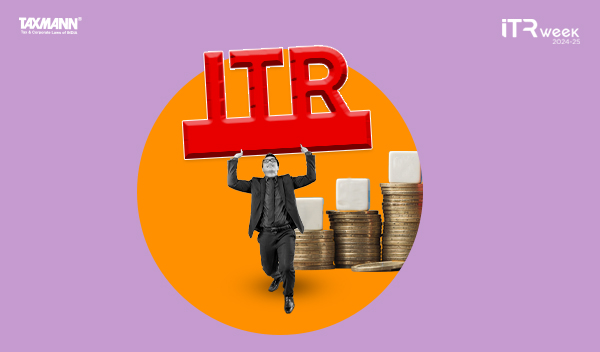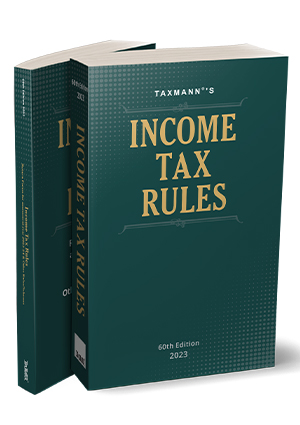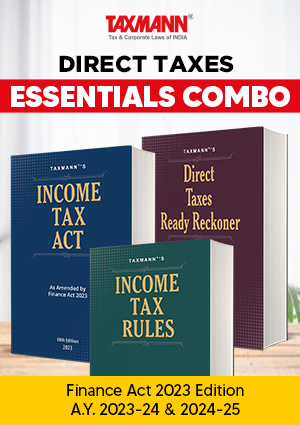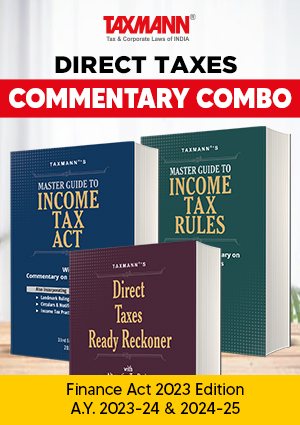[FAQs] Income Tax Returns (ITR) | Annual Information Statement (AIS)
- ITR Week 2024-25|Blog|Income Tax|
- 4 Min Read
- By Taxmann
- |
- Last Updated on 19 June, 2024

The Annual Information Statement (AIS) is a detailed summary of an individual's financial transactions throughout the year, including TDS/TCS, specified financial transactions, tax payments, demands and refunds, and the status of tax proceedings. It is available on the income-tax e-filing portal and aids in pre-filling the Income-tax Return (ITR) form. Taxpayers can view and provide feedback on their AIS through the portal.
FAQ 1. Certain information about my income and deductions, etc., is pre-filled in the Income-tax return. What is the source of that information?
The Government has expanded the scope of Form 26AS to include detailed information about various financial transactions carried out by an individual throughout the year. The Central Board of Direct Taxes (CBDT[1]) has replaced Rule 31AB with a new Rule 114-I, mandating uploading the Annual Information Statement (AIS) in Form No. 26AS to the taxpayer’s registered account. This form contains information such as:
- Details of Tax Deducted at Source (TDS) and Tax Collected at Source (TCS).
- Specified Financial Transactions (SFT).
- Tax payments.
- Details of demands and refunds.
- Status of pending proceedings.
- Information on completed proceedings.
- Data received from any authority or individual under any law or under agreements as per sections 90 and 90A, and any other relevant data deemed necessary for revenue interests.
This information in the AIS is used to pre-fill relevant sections of the Income-tax Return (ITR) form.
| Read More Annual Information Statement (AIS) on Taxmann.com/Practice) |
FAQ 2. Can a taxpayer access the information available in the Annual Information Statement (AIS)?
Taxpayers can view their AIS by logging into their income-tax e-filing account. If any details in the AIS appear to be incorrect, duplicate or pertain to another individual, taxpayers can provide feedback directly through the portal. They can also access AIS information via an offline utility if preferred.
FAQ 3. How to access the Annual Information Statement (AIS) online?
Follow these steps to access AIS information online:
Step 1 – Log in to the Income-tax e-filing website at https://www.incometax.gov.in/. New users must register first.
Step 2 – After logging in, navigate to Services > Annual Information Statement (AIS).
Step 3 – A prompt will appear; click ‘proceed’ to be redirected to the AIS homepage.
Step 4 – The next screen will show the AIS and Taxpayer Information Summary (TIS) instructions. The TIS categorises AIS data and shows original and revised values used to pre-fill the tax return.
Step 5 – Click on the ‘AIS‘ tab. You will see two options: Taxpayer Information Summary (TIS) and Annual Information Statement (AIS). Choose the financial year from the dropdown and click on the AIS tile to view the information.
Step 6 – AIS information is divided into Part A and Part B on the next screen.
- Part A includes general taxpayer information (e.g., PAN, Aadhaar, Name, Date of Birth, Mobile Number, Email ID, Address).
- Part B contains detailed financial data for the selected year, including:
-
- TDS/TCS Information
- SFT Information
- Tax Payments
- Demands and Refunds
- Other Information
Step 7 – AIS data can be downloaded in CSV, JSON, or PDF formats. CSV downloads are per transaction category, while the entire AIS can be downloaded in PDF or JSON. Note that PDFs are password-protected. The password combines the PAN (in lowercase) and the date of birth or incorporation, formatted as DDMMYYYY without spaces.
For example, if the PAN is AAAAA1234A and the date of birth is January 21, 1991, the password will be aaaaa1234a21011991.
| Read More How to access the Annual Information Statement (AIS) online? on Taxmann.com/Practice) |
FAQ 4. What should I do if the information in AIS is incorrect or does not belong to me?
If a taxpayer finds any incorrect, duplicate, or unrelated information in the AIS, they can submit feedback online through the income-tax e-filing portal or via an offline utility.
| Read More How to submit feedback on AIS Information (online)? on Taxmann.com/Practice) |
FAQ 5. How to submit feedback on AIS Information (online)?
To provide feedback on AIS information, follow these steps:
Step 1 – Visit the Income-tax e-filing portal and access the AIS.
Step 2 – In the AIS, detailed financial data for the selected year is available under Part B in various categories:
- TDS/TCS Information
- SFT Information
- Tax Payments
- Demands and Refunds
- Other Information
Step 3 – Click on the relevant category tab to view detailed information.
Step 4 – Click the left-hand icon to expand and view transaction-level details.
Step 5 – To provide feedback, click on the ‘Optional’ tab in the feedback column for the concerned transaction. Feedback can be submitted in bulk for multiple transactions.
Taxpayers can select from various feedback options, such as:
- Information is correct.
- Information is not fully correct.
- Information pertains to another PAN/year.
- Information is duplicate/included elsewhere.
- Information is denied.
- Custom feedback based on the transaction type, including an option for ‘Income is not taxable’ for income-related transactions.
Step 6 – After submitting feedback, a success message will appear, indicating that the Taxpayer Information Summary (TIS)[2] will be updated accordingly. The feedback may also be shared with the information source for further review. An acknowledgement receipt can be downloaded from the activity history.
| Read More How to submit feedback on AIS Information (online)? on taxmann.com/Practice) |
[1] Notification No. G.S.R. 329(E), dated 28-05-2020
[2] Taxpayer Information Summary (TIS) displays the information available in AIS category-wise. It shows original value as well as revised value (i.e., value processed after taxpayer’s feedback). The revised values in TIS is used for prefilling of return.
Dive Deeper:
Income Tax Returns (ITR) | Which ITR Form is to be filed for AY 2024-25
[FAQs] Income Tax Returns (ITR) | Requirement to File ITR
Income Tax Returns (ITR) | New Tax Regime vs. Old Tax Regime
[FAQs] Income Tax Returns (ITR) | Updated Returns
[FAQs] Income Tax Returns (ITR) | Reporting in Schedules in ITR
[FAQs] Income Tax Returns (ITR) | e-Filing of ITR
[FAQs] Income Tax Returns (ITR) | Capital Gains
[FAQs] Income Tax Return | Tax Payment | TDS | TCS | Refunds
[FAQs] Income Tax Returns (ITR) | Deductions & Rebates
[FAQs] Income Tax Returns (ITR) | Set-off of Losses
[FAQs] Income Tax Returns (ITR) | Clubbing of Income
Disclaimer: The content/information published on the website is only for general information of the user and shall not be construed as legal advice. While the Taxmann has exercised reasonable efforts to ensure the veracity of information/content published, Taxmann shall be under no liability in any manner whatsoever for incorrect information, if any.

Taxmann Publications has a dedicated in-house Research & Editorial Team. This team consists of a team of Chartered Accountants, Company Secretaries, and Lawyers. This team works under the guidance and supervision of editor-in-chief Mr Rakesh Bhargava.
The Research and Editorial Team is responsible for developing reliable and accurate content for the readers. The team follows the six-sigma approach to achieve the benchmark of zero error in its publications and research platforms. The team ensures that the following publication guidelines are thoroughly followed while developing the content:
- The statutory material is obtained only from the authorized and reliable sources
- All the latest developments in the judicial and legislative fields are covered
- Prepare the analytical write-ups on current, controversial, and important issues to help the readers to understand the concept and its implications
- Every content published by Taxmann is complete, accurate and lucid
- All evidence-based statements are supported with proper reference to Section, Circular No., Notification No. or citations
- The golden rules of grammar, style and consistency are thoroughly followed
- Font and size that’s easy to read and remain consistent across all imprint and digital publications are applied






An Income Tax Return (ITR) is a form used to file income tax with the Income Tax Department. An Annual Information Statement summarizes financial transactions of a taxpayer.